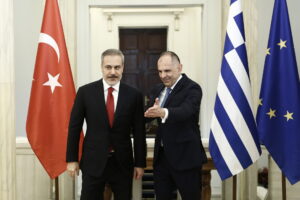Greece appears to be once again positioned at the center of intense and multi-level geopolitical competition, as demonstrated by yesterday’s statements from Russian Foreign Ministry spokesperson Maria Zakharova and the Chinese ambassador in Athens. These statements came as a direct response to the impressive energy agreements signed by the Greek government with the US, in the presence of four ministers from the Trump administration, US Ambassador Kimberly Guilfoyle, and dozens of high-ranking American officials.
Moscow’s provocative warning
With a particularly sharp tone, Russian diplomacy spokesperson Maria Zakharova issued a provocative warning to Greece regarding the agreement for joint production of naval drones with Ukraine. She accused our country of following a “provocative, confrontational course against Russia” and participating in “openly hostile actions.” Zakharova reminded that Greece was “among the first countries to send weapons and ammunition” to Kiev, claiming these are used “daily against civilians” in Russian-controlled areas. She also characterized the recent Athens-Kiev agreements as “new confirmation” of our country’s participation in Western anti-Russian policies, threateningly warning that “there will be an appropriate response from Moscow.”
Athens’ response
The reaction from Greek diplomacy was immediate and firm. Sources from the Foreign Ministry emphasized that Greece acts “guided by international law and respect for state sovereignty.” They also stressed that every country has the inherent right to conclude interstate agreements, especially when these “guarantee energy sufficiency and security — a fundamental factor of human prosperity.” The same sources “categorically” rejected any form of threat against a sovereign state.
Greece in Europe’s new energy map – The pivotal year 2028
This development unfolds after recent events that place Greece at the core of a broader energy reconfiguration. 2028 represents a milestone for the European Union, as it definitively stops importing Russian natural gas — a strategic choice that seals the end of Europe’s long-term energy dependence on Moscow.
The departure of Russian natural gas from the European market creates a massive void, which — according to current agreements — is now being filled by American LNG. And Greece, through new infrastructure, expansions of LNG terminals, and recent Greek-American agreements, is emerging as one of the key hubs for channeling American natural gas to the European continent. Our country’s role is being upgraded from a simple energy corridor to a geostrategic partner of the US, a fact that explains — at least partly — Moscow’s aggressive stance. As LNG from the US will enter Europe through Greek infrastructure, Greece’s geopolitical significance is exponentially enhanced, but at the same time, pressures from competing power centers are also increasing.
Chinese ambassador’s pointed remarks toward the US
Within this framework, Chinese Ambassador Fang Qiu sent a clear message to Washington from Athens, regarding discussions about Cosco’s presence in Piraeus. He emphasized that the port “will always belong to the Greeks” and that Cosco will continue its unimpeded cooperation with Greek authorities.
Delivering sharp criticism toward the US, he said that “those who never helped Greece are now appearing,” emphasizing that they “underestimate the determination of the Greeks.” Speaking of a “hegemonic way of thinking,” he accused Washington of seeking to turn Greece into an “arena of geopolitical rivalry.”
The ambassador, essentially responding to recent pointed remarks by US Ambassador Kimberly Guilfoyle, who called it “unfortunate” that China, through Cosco, controls the port of Piraeus, defended Chinese investments, noting that Piraeus “created thousands of jobs, contributed significant tax revenues, and boosted Greek GDP,” while adding that “hundreds of electric buses from China are already circulating in Athens and Thessaloniki.” The event concluded with the honoring of former Prime Minister Kostas Karamanlis.




